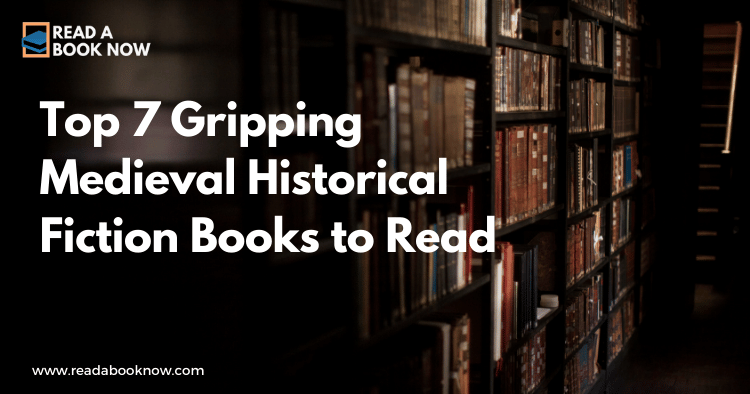Table of Contents
- Introduction
- 1. “The Pillars of the Earth” by Ken Follett
- 2. “The Name of the Rose” by Umberto Eco
- 3. “The Canterbury Tales” by Geoffrey Chaucer
- 4. “The Last Kingdom” by Bernard Cornwell
- 5. “The Once and Future King” by T.H. White
- 6. “A Distant Mirror: The Calamitous 14th Century” by Barbara W. Tuchman
- 7. “The Archer’s Tale” by Bernard Cornwell
- Conclusion
- FAQs
Introduction
Medieval history is a fascinating era filled with kings, queens, battles, and intrigue. The blend of fact and fiction in historical novels allows readers to immerse themselves in the rich tapestry of the past. Whether you’re drawn to tales of chivalry, political maneuvering, or the daily lives of common folk, medieval historical fiction has something for everyone. From epic sagas to intimate character studies, here are seven gripping medieval historical fiction books that will transport you to another time.
1. “The Pillars of the Earth” by Ken Follett
Set in 12th-century England during the tumultuous years of civil war, “The Pillars of the Earth” follows the lives of several characters as they navigate the complexities of love, ambition, and betrayal. Central to the story is the construction of a grand cathedral in the fictional town of Kingsbridge, which serves as a backdrop for the intertwined fates of a mason, a noblewoman, and a scheming bishop.
Follett’s masterful storytelling and meticulous research create a vivid picture of medieval life, exploring themes of power, faith, and perseverance.
Why Read It?
Readers are drawn into the political intrigue and personal dramas that unfold against the backdrop of historical events.
Visual Element:
| Aspect | Details |
|---|---|
| Setting | 12th-century England |
| Themes | Ambition, betrayal, faith |
| Character Types | Nobles, builders, clergy |
| Notable Features | Detailed architectural descriptions |
Learn more about Ken Follett here.
2. “The Name of the Rose” by Umberto Eco
In “The Name of the Rose,” a historical mystery unfolds in an isolated Italian monastery during the 14th century. The story follows Brother William of Baskerville and his apprentice, Adso, as they investigate a series of mysterious deaths. As they delve deeper, they uncover a labyrinth of secrets, heresies, and philosophical debates.
Eco’s novel is a rich tapestry of historical detail, philosophical inquiry, and suspense.
Why Read It?
The interplay between faith and reason, alongside the vivid portrayal of monastic life, makes this book a unique blend of mystery and intellectual exploration.
3. “The Canterbury Tales” by Geoffrey Chaucer
Written in the late 14th century, “The Canterbury Tales” is a collection of stories told by a diverse group of pilgrims traveling to Canterbury. Chaucer’s characters range from the noble Knight to the raucous Miller, each presenting their tale filled with humor, romance, and social commentary.
Chaucer offers a snapshot of medieval society, providing insight into various social classes and the human condition.
Why Read It?
The stories are entertaining, often humorous, and serve as a critique of the societal norms of the time.
Visual Element:
| Tale | Character | Theme |
|---|---|---|
| The Knight’s Tale | The Knight | Chivalry and honor |
| The Wife of Bath’s Tale | The Wife of Bath | Gender roles and feminism |
| The Miller’s Tale | The Miller | Class conflict and humor |
Explore more about Chaucer’s work here.
4. “The Last Kingdom” by Bernard Cornwell
The first book in Cornwell’s “The Saxon Stories” series, “The Last Kingdom” follows Uhtred of Bebbanburg, a Saxon nobleman captured by Vikings. Torn between two cultures, Uhtred grapples with loyalty, identity, and revenge as he seeks to reclaim his ancestral home.
Cornwell’s gripping narrative and vivid battle scenes bring the Viking Age to life.
Why Read It?
His attention to historical detail and character development creates a compelling story that keeps readers on the edge of their seats.
5. “The Once and Future King” by T.H. White
This modern retelling of the Arthurian legends, “The Once and Future King,” explores the life of King Arthur, from his childhood with Merlin to his reign as a monarch. White combines elements of fantasy with profound philosophical questions about power, justice, and the nature of humanity.
White’s unique blend of humor, magic, and moral dilemmas makes this story an enduring classic.
Why Read It?
His characters are richly developed, and the narrative challenges readers to reflect on the complexities of leadership.
6. “A Distant Mirror: The Calamitous 14th Century” by Barbara W. Tuchman
While not strictly a work of fiction, Tuchman’s “A Distant Mirror” offers a historical narrative that reads like a novel. It examines the tumultuous 14th century, marked by the Black Death, the Hundred Years’ War, and social upheaval.
Tuchman’s engaging prose and thorough research provide insight into a pivotal period in history.
Why Read It?
The book connects past events with contemporary issues, making it relevant for modern readers.
Discover more about Tuchman’s historical works here.
7. “The Archer’s Tale” by Bernard Cornwell
In this thrilling novel set during the early 14th century, “The Archer’s Tale” follows the journey of a young archer named Thomas of Hookton. As he seeks revenge for the murder of his father, he becomes embroiled in the conflicts of the time, including the Hundred Years’ War.
Cornwell’s expertise in historical detail shines through in this action-packed narrative.
Why Read It?
The portrayal of archery and warfare adds authenticity and excitement to the story, captivating readers from start to finish.
Conclusion
Medieval historical fiction is a vibrant genre that allows us to explore the complexities of human experience through the lens of history. Each of the books mentioned above offers a unique perspective on this fascinating era, filled with adventure, intrigue, and deep human emotion.
Whether you are a seasoned reader of historical fiction or just starting, these titles are sure to captivate and inspire you.
For further exploration of literature that captures the essence of historical storytelling, consider checking out Top 7 Ancient Classics Everyone Should Read Today and Top 7 Must-Read Medieval Literature Classics You Can’t Miss.
FAQs
1. What makes medieval historical fiction different from other genres?
Medieval historical fiction focuses specifically on events, figures, and societal norms from the medieval period (roughly 5th to late 15th centuries), often blending real historical events with fictional narratives.
2. Are these books historically accurate?
While authors often take creative liberties, many strive for a high degree of historical accuracy. It’s always a good idea to check the author’s notes or references for more context.
3. Can I read these books if I’m not familiar with medieval history?
Absolutely! These novels are designed to be engaging and informative, making them accessible to readers new to the subject.
4. Are there more medieval historical fiction books worth reading?
Absolutely! There are many more titles worth exploring, including works by authors like Hilary Mantel and Sharon Kay Penman.
Whether you’re looking for a sweeping epic or an intimate character study, the world of medieval historical fiction awaits. Happy reading!



